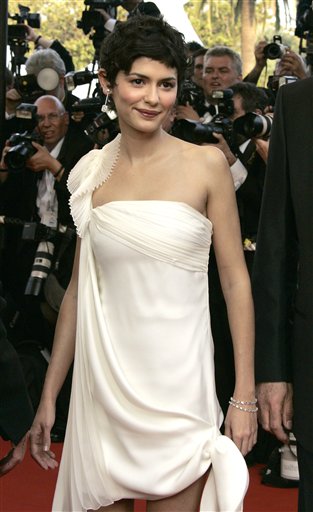We are developing the social individualist meta-context for the future. From the very serious to the extremely frivolous... lets see what is on the mind of the Samizdata people.
Samizdata, derived from Samizdat /n. - a system of clandestine publication of banned literature in the USSR [Russ.,= self-publishing house]
|
The music business has fought tooth and nail against digitalisation in general and the internet in particular and I have long suspected that regardless of how it struggles, eventually Big Music will go the way of the buggy-whip industry, with music returning to its ‘craft’ roots and simply ceasing to be a big business, at least in the way that is currently understood, the mass market eventually giving way to a mass-of-niches.
I wonder if this is a sign that future has taken a step closer?
Sandi Thom, the unknown singer-songwriter who built up a huge following on the internet, went straight to No 1 with her debut single. The 24-year-old shot to fame after claims that her live performances in the basement of her home were being watched by more than 100,000 people via the web.
Regardless of sour grapes claims the viewing figures were inflated in this case, I wonder if the wave of the future has arrived?
I occasionally watch the Top Gear motoring-lads-having-a-laugh show on a Sunday evening, fronted by the bumptious Jeremy Clarkson. Clarkson is a sort of British version of P.J. O’Rourke, (although O’Rourke is at his best in print, rather than on the box) in that he loves to mock cyclists, Greens, do-gooders and other earnest protectors of our public welfare. Excellent. It is amazing really that his show has run on the BBC for so long. His mails must include a fair share of rudeness from those he mocks and it looks like he has really got up the nose of veteran Green campaigner Jonathan Porritt, a person who at one stage was very much the “reasonable” face of environmentalism.
Porritt misses the point completely. He is part of a puritanical new establishment dedicated to the removal of fun, or at least that of those other than themselves. We have had more than a decade of this, and Clarkson is rather like a shot of brandy to the half-drowned. He may be overly laddish for some people’s tastes, but he acts as handy counterweight to the scolds. Long may he sing the praises of Ferraris, supersonic jet aircraft and other fast machines.
(I have classified this post under “Arts and Entertainment” since Top Gear is purely entertainment. Do not expect to learn a lot about practical car maintenance.)
Last night Adriana showed me a very strange DVD which will probably not appeal to folks who dislike ‘art house’ movies… but if you like bizarre English phantasmagoria at its quirkiest, set in Brighton and by Neil Gaiman and Dave McKean no less, then you will probably just love Mirrormask.
Young actress Stephanie Leonidas has presence beyond her years and reminded me of the young Natalie Portman in Leon, which makes me think she may be one to watch in the future.
I particularly liked the evil sphinx-cats. It is all intensely English, in a magic mushroom induced hallucinogenic Alice in Wonderland sort of way. “We are not at home to Mister Grumpy”.
Blogger and friend Andrew Ian Dodge, at one of his many venues, Tech Central Station, offers this poser on the recent, ahem, bracing winners of the Eurovision song contest:
Does Lordi’s win reflect the rot in Europe, a final admission of rock’s power on the continent? Or is it merely an unintentional blip that Eurovision’s chiefs will seek to keep from ever recurring? Will heavy-metal find its way into Finland’s EU presidency? Is it just a silly music contest won by a bunch of rubber clad nut-cases? Oh no dear reader. It is far more than that.
Hey, heavy metal music is not exactly everyone’s cup of tea, although I often find that the most unusual sorts of people (mostly men, but some women too), will confess to a passion for the odd heavy metal track, played as loud as possible. I have had some of the funniest and most enjoyable nights out at gigs where such nutters play. Most of these people don’t take themselves remotely seriously. The very fact that their music offends “right thinking” people of the crusty left and the crunchy right only adds to the appeal. Rush, the Canadian rock band, were inspired by Ayn Rand. The Iron Maiden front man, Bruce Dickinson, is a qualified and working commercial airline pilot. Heavy rockers often seem to have an equal passion for gadgets and cars. I once visited a Royal Navy warship at London’s Docklands and went into the navigation/weaponry control room, and in the background, ACDC was playing (Very ideologically sound, if you ask me).
Meanwhile, on the subject of music competitions and the usual feelgood sense of life they tend to give out, this comment by Timothy Sandefur on the recently completed American Idol is rather nice:
Moreover, American Idol is a rebuke to those silly “crunchy conservatives” who insist that modern technology and mass production denigrates community, and so forth – in T.S. Eliot’s idiotic words, “The remarkable thing about television is that it permits several million people to laugh at the same joke and still feel lonely.” But that’s not true! The community has all joined in on this wholesome, fun, harmless moment to celebrate opportunity, singing, and lightheartedness. What could be more American than that? Lightheartedness is, I think, a profound and incredibly rare value, and one which our country has figured out how to mass produce. That may be among its greatest accomplishments ever.
The JPMorgan ‘Technology06’ show for which I was webcast editor in San Francisco finally finished up Wednesday afternoon. After the loadout, or most of it, I and four of the other techs from the show caught the red eye flight back to New York. I dumped clothes into a drawer and crashed for several hours. Despite the work schedule of the last month, I only slept a few hours… the day was just too nice to miss. Call it New York City Spring. A lovely temperature, just a nice humidity, deep blue skies and a lot of smiling faces.
After a bite to eat, some catch up on my work log and a few business calls, I decided to take myself out to a movie in Times Square. Yes, I finally get around to the title line. It was the ‘The Da Vinci Code’.
The biggest question I have after watching the movie is: “What the hell is all the fuss about???” This is a decently enough done adventure/conspiracy story, typical summer fare, not intended to be great literature or win Oscars. It is just fun. Given the infantile sensitivities of our politically correct, ‘do not dare hurt anyone’s feelings lest they cry’ era, they stuck in a bit of unnecessary dialogue to make really, really sure no one would feel slighted. Perry has already spoken of what the real Opus Dei is; and in the movie they are not the bad guys either. The bad guys are a secret inner circle which just happens to have some members there. A sort of ‘Catholic Illuminati’ as it were. Yet it is a real ‘Opus Dei’ believer who in the end saves our heroes through his belief in truth and justice.
As to the premise Mary Magdalene had a child by Jesus and she was spirited off to France and secret organizations have warred in the shadows over this for some two thousand years… I ask, if people are so terribly upset about this story, then what of the various Indiana Jones movies? Or any of a hundred novels and movies I have read or seen which use biblical history as a kick-off point for a roaring good yarn?
My conclusion is the people making noise about this movie need to get themselves unwound a bit.
Now a question. Skip the Magdalene story. Prove to me through historical, documented facts of known and cross checked authenticity and provenance that Jesus Christ never knocked up any of his adoring fans. Prove to me that prophet never got himself laid. Not once. Given two thousand years and eighty to a hundred generations, virtually all of humanity could have a bit of JC’s bloodline.
I have seen worse. Ian McKellen stole the show. Wait for the DVD.

At least I have an excuse for this…
I have been travelling and swamped with work since the space development conference in Los Angeles – so much so I have not even had time to post articles I have already written. From LA I went to NY and on to DC where I spent a week trying to working on a new product for an Internet Service Provider. Then I returned to Manhattan for one day: a day which by chance coincided with the opening of ‘The Da Vinci Code’ in Times Square.
I just had to go.
I went down in late afternoon after prepping for my next trip (I am as I write this at the gate for a San Francisco flight). Unfortunately, it was already sold out until near midnight.
 Photo: Dale Amon all rights reserved Photo: Dale Amon all rights reserved
Near the theatre there were a handful of religious picketers. This included some little old ladies handing out flyers but the biggest group appeared to be a Catholic one.
 Photo: Dale Amon all rights reserved Photo: Dale Amon all rights reserved
Evidently God was not quite on their side as a gust of wind knocked their large steel framed sign over, nearly hitting some passing pedestrians, not long after I took the photo.
Some authoritarian asses in India who are enraged that a work of fiction called the Da Vinci Code will be shown in cinemas to anyone who wishes to see it, have threatened to starve themselves to death in protest if the movie is not banned by the state.
If these particular Christian protesters are as good as their word and are so keen to snuff it and thereby put their theories to the test, namely that there is a God and their actions (i.e. attempting to use the force of law to prevent freedom of expression followed by suicide if they are unsuccessful) would be viewed favourably by their deity, well why should anyone want to stop them?
It is good to see efforts being made to remind people just how monstrous things were in Eastern Europe before the collapse of communism. Films like Life of Others (Das Leben der Anderen) should be a good antidote to those who like to equate the oppressor and the oppressed.
Just as it only took a few years for revisionist liars like David Irving to try and re-write the history of Nazi Germany more in accordance with their likes, too many left wingers who praised the prevailing socialist system in Eastern Europe have not been forced to confront what it was they were supporting and what they wanted to force on the rest of us. What a pity there was nothing analogous to the process of ‘de-Nazification’ following the fall of the Berlin Wall.
Here is an interesting story. A friend of Jackie D (to whom thanks for the link) called Amy Alkon has discovered an artist. He is now homeless, but something tells me he is not going to be homeless for long.
His name is Gary Musselman, and here is one of his drawings:
Amy put that at the top of her posting, surely knowing that this would appeal to the blogosphere, although I rather prefer “Wichita” myself. Scroll down to see that.
These are the kind of drawings now sufficiently out of date in artistic style to appeal to large numbers of the general public, especially the sort who are internet-connected, but to be disapproved of by the regular art critics, who will not, I predict, approve. “Derivative”, “emotionally empty”, etc. Their real objection will be that their verdicts aren’t going to count. Not this time.
Jackie D has already equipped Gary Musselman with his own blog, and the story is now gathering pace.
Jeff Jarvis is consulting the BBC, and is excited over the Beeb’s claims that it wants to “reinvent” itself. Here is what I said to Jeff:
Jeff, the point is that the BBC doesn’t want to ‘reinvent’ the very worst element of itself: the funding via shakedown of Joe Public. We’re not talking about a situation where a small percentage of the income tax or sales tax a person pays over a year is diverted to the BBC. One cannot own a radio or television without paying a ‘protection fee’ – Mafia-style – to the BBC. Don’t pay? You get a huge fine, and if you don’t or can’t pay it, you are thrown in prison.
The BBC is not going to ‘reinvent’ the threat of violence under which they operate. It’s not even a remote possibility. Ask some of your contacts there what the odds are, and I assure you they’ll laugh in your face.
The facts are inconvenient and chilling, but they are facts. Isn’t that what journalism is supposed to be about?
I really do not understand how people – not just Jeff, because there are a hell of a lot of them – who would be outraged over being shaken down by corporate interests can be so qualm-free about being shaken down by politicians and bureaucrats. Then again, these are often the same people who fully realise how incompetent and corrupt politicians and bureaucrats are, yet want to give them more and more responsibility for running a big chunk of our lives (healthcare, education, you name it). Cognitive dissonance, anyone?
Rumours are afoot that Brad Pitt and Angelina Jolie are going to be in Hollywood’s attempt to bring Atlas Shrugged to the big screen. They might make an interesting pair to play John Galt and Dagny Taggart.
|
Who Are We? The Samizdata people are a bunch of sinister and heavily armed globalist illuminati who seek to infect the entire world with the values of personal liberty and several property. Amongst our many crimes is a sense of humour and the intermittent use of British spelling.
We are also a varied group made up of social individualists, classical liberals, whigs, libertarians, extropians, futurists, ‘Porcupines’, Karl Popper fetishists, recovering neo-conservatives, crazed Ayn Rand worshipers, over-caffeinated Virginia Postrel devotees, witty Frédéric Bastiat wannabes, cypherpunks, minarchists, kritarchists and wild-eyed anarcho-capitalists from Britain, North America, Australia and Europe.
|









